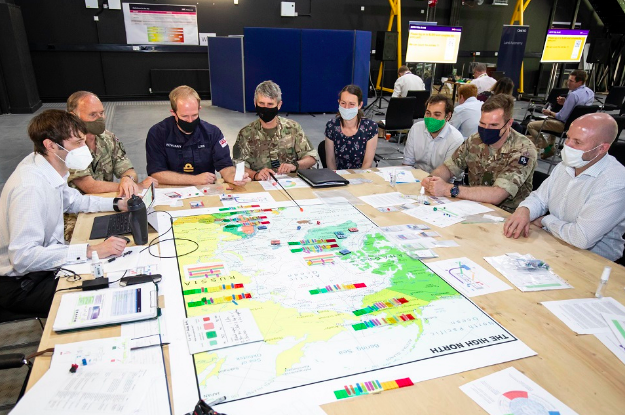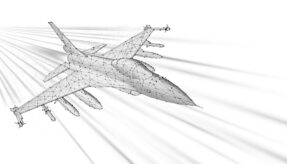
Attendees of Dstl’s inaugural Influence Wargaming Conference tested their influencing and decision-making skills against a series of real-life international scenarios.
The event provided an opportunity for civil servants and military officers to experience wargames based on influencing behaviours using physical and non-physical force, share specialist knowledge and identify potential user requirements for further investigation.
Held on Monday 19 July at QinetiQ’s Training Innovation Facility, and attended by UK Ministry of Defence (MOD) and government representatives seeking to integrate influence activities into their areas of work, the event was organised by a multi-disciplinary team comprising members from across academia, industry and defence.
The conference showcased wargames developed as part of the Defence Science and Technology Laboratory’s Representation of Behavioural Effects (RBE) project. The RBE project conducts science and technology (S&T) activities to improve the representation, integration and synchronisation of non-kinetic / behavioural effects in decision-support tools such as wargaming, modelling and simulation.
Wargames provide structured and safe-to-fail environments to help explore what works (winning / succeeding) and what doesn’t (losing / failing). At the core of wargames are: the players; the decisions they take; the narrative they create; their shared experiences; and the lessons they take away.
The work from this conference will help determine how better to wargame influence and how to include influence within wargames that have not considered it before. Incorporating influence within wargames will better represent the current and future character of warfare, as set out in the Integrated Review and thus better informing decision-making within UK government.
The event was supported by the Joint Information Activities Group (JIAG), which trains around 600 people a year in influence activities.
Commanding Officer Lt Col Pat Owen said: “At JIAG we use wargaming to support our training in several areas, and it has always proved popular with both students and staff. We’re delighted to have been part of the workshop, and look forward to supporting the research project in the future.”
Jess Lowe, the lead for Dstl’s Influence Programme, stressed the importance of the work, which will serve to promote best practice through the creation of a Development, Concepts and Doctrine Centre (DCDC) Wargaming Influence Handbook. Jess said: “Information advantage is at the heart of how UK defence must operate to achieve influence in this more complex and competitive world.
“This Wargaming Influence Conference was an opportunity to share, test and improve the novel concepts and approaches that Dstl is developing to help decision-makers in UK defence and government better plan and achieve influence overseas.”
Commenting on the success of the conference, DCDC’s Chief of Staff, Group Captain Martin Ogden, added: “We are grateful to all those who contributed – their valued input will enable us to assess and, where appropriate, develop game methods and mechanisms that can be used by the MOD community to represent and adjudicate influence activity for concept, capability and warfare development purposes.
“The generation of the handbook from this research is a great demonstration of how we can work together with Dstl to close capability gaps and provide useful guidance for practitioners across defence.”
image © Crown Copyright. Photographer: SAC Charlotte Hopkins, JIAG
If you would like to join our community and read more articles like this then please click here







